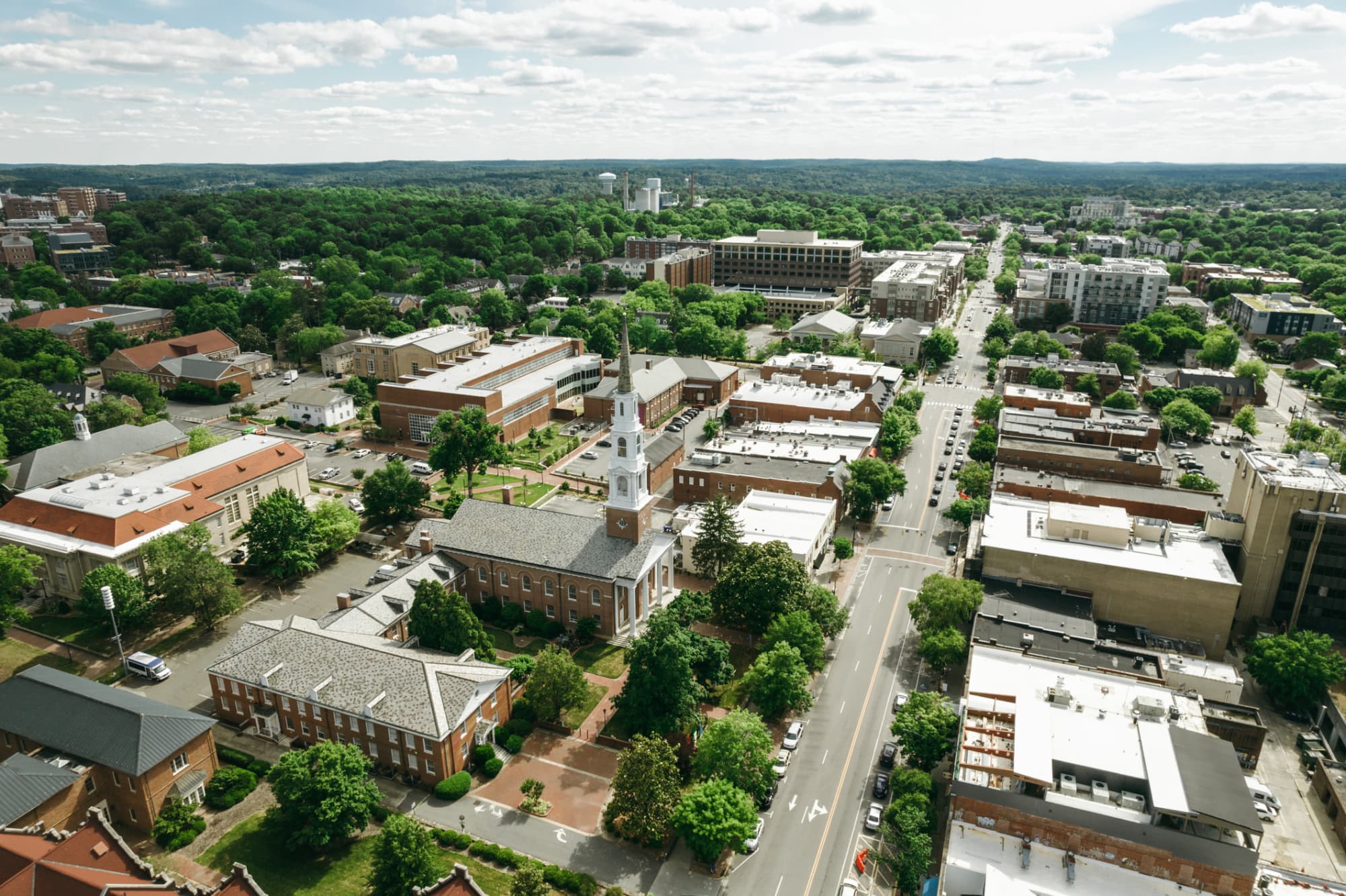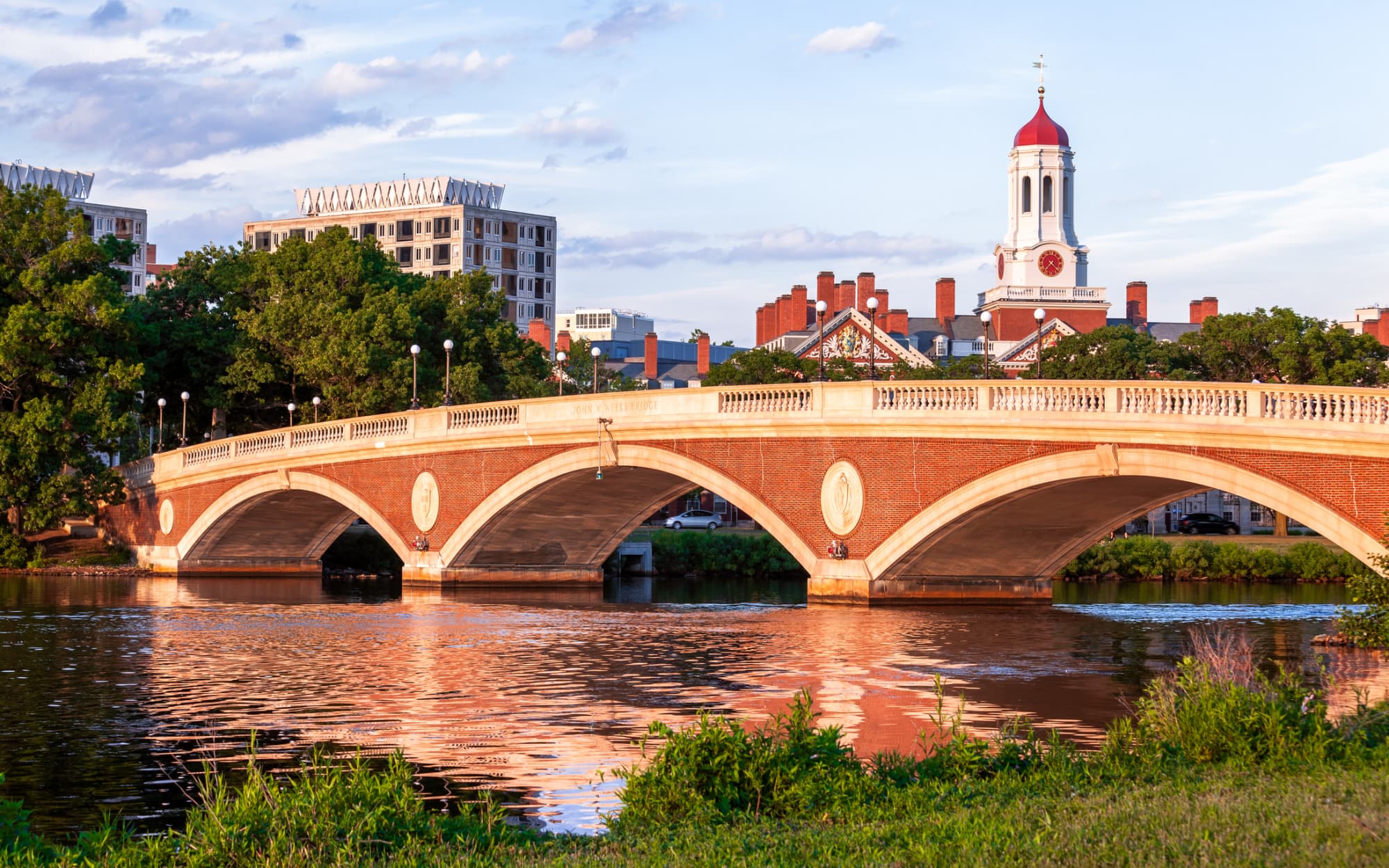CollegeChoice.net is an advertising-supported site. Featured or trusted partner programs and all school search, finder, or match results are for schools that compensate us. This compensation does not influence our school rankings, resource guides, or other editorially-independent information published on this site.
Turn Your Dreams Into Reality
Take our quiz and we'll do the homework for you! Compare your school matches and apply to your top choice today.
In seeking a college degree after serving in the military, veterans take advantage of resources that support their educational goals. The best schools for veterans offer networks and financial aid to further their veteran students' education. In 2018, over 650,000 veterans used military benefits to earn degrees in a variety of subjects, including business management and STEM.
The Post-9/11 GI Bill® and Yellow Ribbon Program both offer financial assistance to veterans while they earn their degrees. These programs accommodate the unique challenges student veterans face, such as potential deployment or relocation during school. This list contains veteran-friendly schools to consider.
Colleges With the Best Veteran Programs
- Texas A&M University - College Station
- University of North Carolina at Chapel Hill
- University of Florida
- University of Minnesota - Twin Cities
- Rutgers University - New Brunswick
- University of Wisconsin - Madison
- University of Utah
- Florida State University
- Creighton University
- George Mason University
Benefits at Military-Friendly Colleges
Financial support comes in a variety of forms, depending on where veterans are in their careers when pursuing a college degree. Young students may enroll in the Reserve Officers’ Training Corps program to help fund their education. The ROTC expects participants to serve after completing their degree. Other learners might use one of two bills aimed at current or former military service members.
The Post-9/11 GI Bill and the Montgomery Bill offer similar benefits. The main difference between the two bills is how the money is allocated toward recipients' education. The Post-9/11 GI Bill prorates recipients' financial support based on how long they served in active duty. This bill requires at least 36 months of service dated after Sept. 11, 2001. The Montgomery Bill allows lump-sum contributions for students who did not serve the necessary three years.
In most scenarios, the Post-9/11 GI Bill offers more financial assistance than the Montgomery Bill. The Yellow Ribbon Program, another common benefit, helps pay for tuition the Post-9/11 GI Bill does not cover. Students must qualify separately for this program.
The U.S. Department of Veterans Affairs offers more detailed information about GI Bill benefits for veterans and active-duty military members.
Check out other financial aid options
Best Colleges and Universities for Veteran Students
The best colleges and universities for veterans incorporate the GI Bill, offering their students financial support for their degrees. Military-friendly schools offer services like campus student-veteran groups, campus veteran counselors, veteran upward bound programs, and participation in the veteran Principles of Excellence program, which ensures veteran success in higher education. Read through some of the best schools for veterans here.
Texas A&M University - College Station
College Station, Texas
Veteran Support
Texas A&M University - College Station offers student veterans financial and social support while they complete their degrees. Over 2,000 students enrolled at the university use the GI Bill. The average tuition awarded from the GI Bill was $9,525, and the school offers some credit for military training. The Veterans Services Office helps veterans find the best on-campus programs for their interests and goals.
Academic Offerings
Texas A&M acceptance rate is 71%, and the school features a student-to-faculty ratio of 21-to-1. Of Texas A&M instructors, 87% teach classes full time. This public university boasts a first-year student retention rate exceeding 90%, and most students complete their bachelor's degree in four years. The school's student loan default rate is 2.1%, far less than the national average.
University of North Carolina at Chapel Hill
Chapel Hill, North Carolina
Veteran Support
Student veterans apply for in-state tuition and submit a University of North Carolina - Chapel Hill Veteran Educational Benefits Enrollment Data Form after enrolling for classes. Learners qualify for reimbursement for tutoring services as well. Veteran benefits get calculated into students' overall financial aid packages. On-campus programs like the Carolina Veterans’ Organization support veterans as they pursue their degrees.
Academic Offerings
The University of North Carolina is known for its rigorous coursework. The Hussman School of Journalism and Media houses one of the school's most popular majors. Nearly 30,000 students attend the university, providing it with a diverse population. The overall graduation rate exceeds 80%, with the average undergraduate student aid at $16,164 per year.
University of Florida
Gainesville, Florida
Veteran Support
The University of Florida offers student veterans out-of-state tuition waivers. The university approved the Yellow Ribbon Program in fall 2020, contributing up to $6,500 per year toward tuition. Funding is available for 20 undergraduate and 10 graduate students on a first-come, first-served basis. The university also offers online programs, allowing students to continue their education from anywhere.
Academic Offerings
The University of Florida ranks within the top 100 schools in the country. This makes the school highly competitive, boasting a 42% acceptance rate. Biology, psychology, and public relations land among the most popular degree slots. The average annual cost of UF is $8,057, with 17% of first-year students taking out loans to fund their schooling. The school is one of the most diverse in the region — almost half the student population comprises racial and ethnic minorities.
University of Minnesota - Twin Cities
Minneapolis, Minnesota
Veteran Support
The University of Minnesota provides veteran students with a variety of resources. The Tillman Scholar Foundation offers academic scholarships for veterans to use toward any school-related expenses. The university also provides the Student Veterans Association to help students transition from military to civilian life. A plethora of mental health and academic leadership resources support veteran students.
Academic Offerings
With over 800 GI Bill students, the University of Minnesota is one of the best schools for veterans. It offers credit for military training as well. With an acceptance rate of 57%, admission is more challenging. The student-to-faculty ratio is 17-to-1, which aligns with the national average. Graduates of the University of Minnesota tend to make higher salaries than graduates of other universities directly after earning their degree. Most students earn their degrees in psychology, computer science, and economics.
Rutgers University - New Brunswick
New Brunswick, New Jersey
Veteran Support
Out of the 50,000 students at Rutgers University, GI Bill students make up 442. The average tuition assistance awarded is over $12,000 per year, and students who qualify can earn credit for military training. The Veterans House provides students with opportunities to connect with other veterans for a solid support network as they study.
Academic Offerings
As one of the oldest universities in New Jersey, Rutgers offers an array of benefits for its students. Every year, about 61% of applicants gain admittance to the school, and 60% of students graduate within four years. Students can choose from over 30 schools and colleges, with particular emphasis in biomedical and health services fields. The graduation rate for first-time students is 58%.
University of Wisconsin - Madison
Madison, Wisconsin
Veteran Support
Over 500 GI Bill students attend the University of Wisconsin - Madison. The school offers credit for military training, with the average tuition assistance at $10,489 per year. Veteran specialists in the Office of Financial Aid help student veterans discover the financial and educational support that best meets their needs. On-campus programs provide spaces for student veterans to connect with and support each other.
Academic Offerings
The University of Wisconsin is the highest-ranked school in the state, with a 54% acceptance rate. The student-to-faculty ratio is 17-to-1, helping students ensure quality time with their instructors. Students who want a large campus in a big city would most likely enjoy this college setting. The university offers 128 undergraduate degrees with economics, computer information systems, and psychology among the most popular.
University of Utah
Salt Lake City, Utah
Veteran Support
At the University of Utah, the GI Bill pays a portion of tuition and fees, up to $1,000 for books per year, and housing allowance for University of Utah students. The GI Bill covers only in-state resident tuition and tuition for courses related to the student’s declared major. Students who wish to change their major must earn approval. The Veteran Support Center helps students correctly implement their GI Bill funding and find support on campus.
Academic Offerings
Nearly 1,000 students enrolled at the University of Utah use the GI Bill, with 39 students also qualifying for the Yellow Ribbon Program. Communications, psychology, and business management degrees hold the most popular spots for students. Students choose from over 100 majors. The student-to-faculty ratio is 17-to-1, so students can expect to have plenty of time with their instructors.
Florida State University
Tallahassee, Florida
Veteran Support
Just over 32,000 undergraduates attend Florida State University, of whom 986 students receive GI Bill funding. The Student Veterans Center offers several groups for student veterans. The Women’s Veteran Alliance, Students for the American Military, and STEM Veterans USA provide students with ample opportunities to connect with other veterans and gain support while earning their degrees.
Academic Offerings
This public university in Florida is known for its majors in psychology, finance, and criminal justice. It is ranked as the third-best college in the state. With an acceptance rate of 49%, FSU is among the more difficult schools to gain admission. The first-year retention rate is over 90%, with 63% of students graduating in four years. Veterans who attend FSU can expect to receive a quality education and graduate on time.
Creighton University
Omaha, Nebraska
Veteran Support
Creighton University began supporting veterans over 100 years ago. For students who qualify for the Yellow Ribbon Program, the university matches the monetary amount awarded to students by the program. This combined with tuition support from the Post-9/11 GI Bill ensures that 100% of tuition is covered for veterans. Over 200 students enrolled in Creighton University use the GI Bill, with 34 of those students also qualifying for the Yellow Ribbon Program.
Academic Offerings
This private university is home to several academic opportunities. Students choose from over 50 majors. Nursing, finance, and general biology land account for the three most popular degrees. Most Creighton students attend full time, and 67% of students graduate within four years. The student-to-faculty ratio is 11-to-1, far better than the national average. Students can expect plenty of time to work with their instructors.
George Mason University
Fairfax, Virginia
Veteran Support
With over 2,000 GI Bill students, George Mason University boasts some of the best benefits for veteran students. The university offers credit for military training and awarded $241,726 in Yellow Ribbon Program benefits in previous years. Each degree offers a veteran-specific educational path.
Academic Offerings
George Mason University is one of the best schools in Virginia and has a first-year retention rate of 88%. Computer information systems and criminal justice land in the top two spots as the most popular majors. The acceptance rate clocks in at 81%. The university boasts a 16-to-1 student-to-faculty ratio, offering smaller classes than most public universities. Over half of the student population comprises racial-ethnic minorities, and 20,000 full-time undergraduate students call the university home.
Explore Other College Niches

Best College Towns in America

Colleges and Universities with the Happiest First-Year Students

Best Historically Black Colleges and Universities

Most Historic Colleges in America

Best Restaurants for College Students

Safest Small Colleges and Universities in America

Safest Large Colleges and Universities in America

The Top 10 Schools for Studying Abroad
Frequently Asked Questions
What is a military-friendly college?
A military-friendly college offers specific financial and education assistance for veterans. It works in conjunction with the GI Bill to ensure they receive a quality education. Students find financial aid, veteran-specific scholarships, and veteran support programs at military-friendly colleges.
Are colleges more likely to accept veterans?
Veterans are more likely to get accepted to military-friendly colleges and universities. Military service can also translate into course credit at many schools, allowing students to spend less time and money taking courses.
Do veterans get free university?
Veterans who qualify for the GI Bill and/or Yellow Ribbon Program and who attend a military-friendly school may receive full tuition coverage. Many military-friendly schools offer financial aid and scholarships to veterans who take advantage of these programs.
Is college in the military free?
Active-duty military members and veterans can both take advantage of free college tuition, depending on which programs they qualify for and where they attend school. University fees may be fully covered.
GI Bill® is a registered trademark of the U.S. Department of Veterans Affairs (VA). More information about education benefits offered by VA is available at the official U.S. government Web site at https://www.benefits.va.gov/gibill.
Featured Image: Caelan Stulken / EyeEm / Getty Images
Recommended Reading
Helping you prepare and gain the most out of your educational experience.
Discover a program that is right for you.
Search schools to find the program that is right for you.
